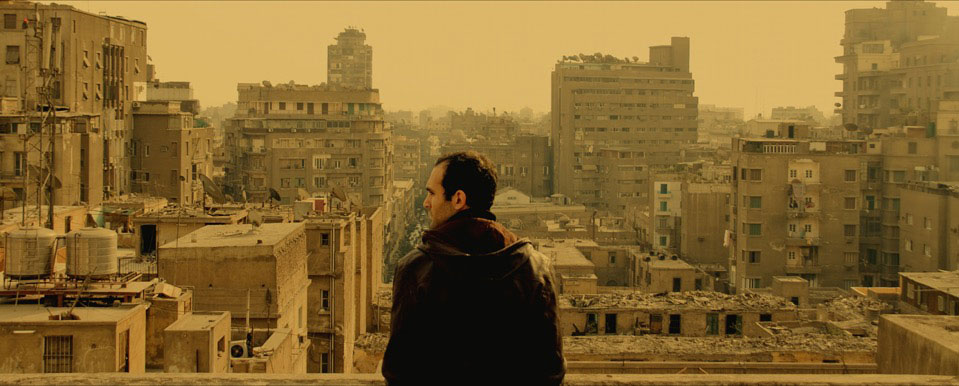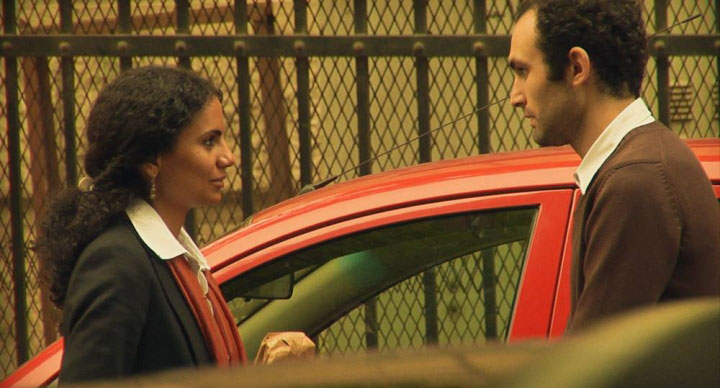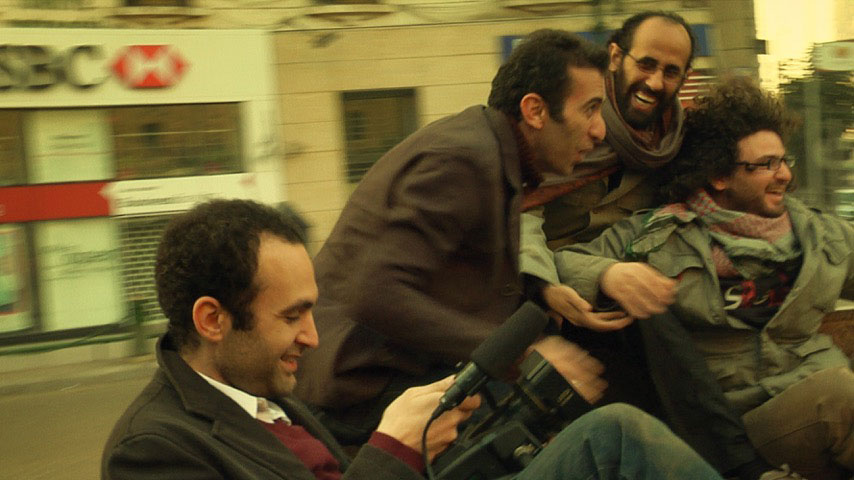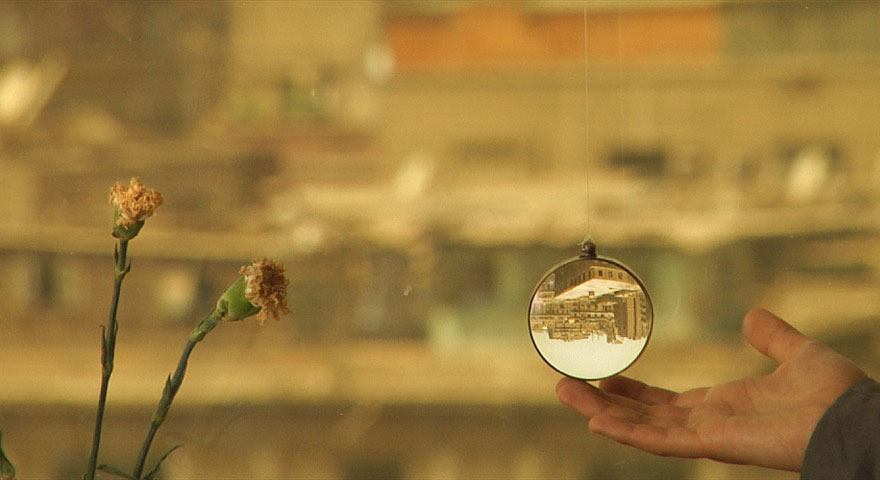Last winter and spring, I was away from my native Cairo for the longest stretch in my life—nearly five months—and with each piece of news about home from friends and family, or even via Twitter, my feelings were conflicted. Little of what was reaching me was good. A journalist friend arrested on a trumped up charge. Someone else I knew barred from leaving the country. Another’s assets frozen. A young activist, feeling defeated, turning herself in, no longer able to fight a venal system intent on manufacturing charges to keep her behind bars. A TV show, a publishing house, shut down. With each passing week, the number of arrests, crackdowns, censorship cases, seemed only to increase. My impulse was at once return home, to be present, to witness and write and support those I knew as best I can, but at the same time, I knew it would be futile.
Then one morning last April, I woke to an email with the subject line, “Townhouse Fell Today.” The somewhat dilapidated nineteenth-century building in downtown Cairo that housed the country’s leading art gallery and cultural foundation had partially collapsed, after cracks had emerged in its walls. I had spent years in it writing and passing time with friends (it was there that a gathering of us watched the results of the 2012 presidential election that Morsi won come in). The building’s collapse seemed to capture the general state of things. A state security entity immediately ordered its complete demolition. A group of us who had been associated with the gallery attempted, by way of emails and phone calls to contacts with sway, to fight to keep the remainder of the building standing. The governor’s office and a local heritage entity seemed persuaded, issuing an order to immediately assess the condition of the building, and consider listing it as a part of the “heritage” of the city to be restored and conserved. But what was deduced to be an arm of the state’s security apparatus, seemingly adamant on erasing this cultural space, which they had earlier raided and shut down for a month (on charges of “administrative irregularities”), sent in a make-shift demolition team the next day at the crack of dawn. They hammered at walls and through floors, tearing down windows, balconies, breaking tiles, pulling wiring out of walls, edging the building to precariousness. This back and forth of intent ensued for days. I set up a Kayak price alert for flights to Cairo, and searched almost compulsively for tickets home.
In the midst of this, as I paced my apartment in New York through several nights, ear attached to my phone on Viber with Cairo, it became clear to me that once again, as citizens, we were impotent, caught in a struggle between different state forces and the larger predicament of a government intent on maintaining “stability,” quashing any possible source of opposition. It appeared that “contemporary art,” to the authorities, was perceived as a “countercultural” force that might stir up dissent. Never had I felt so defeated, so resigned to the reality of loss. The power we had acquired back in 2011, what we had felt as individuals taking to the streets making up a critical mass—that we thought, at the time, would never end—was gone. This sense of resignation was familiar—we had lived with it for decades.
One cold afternoon during this time, I went to the Museum of Modern Art to watch Egyptian director Tamer El Said’s first feature, In the Last Days of the City—a meditative film about Cairo that had been many years in the making. Much of it, in fact, was filmed between 2008 and 2010, during the final Mubarak years, and edited intermittently in the years since. Though I knew dozens of people who were in some way involved with the film, nobody knew the plot, or even the general gist of it, except that it seemed certain to be an epic. Tamer and I first met in 2007, on the urging of a friend who suggested we might collaborate. He was known for short films that defied expectations of genre and form, and he shared a similar sense of belonging—or not quite belonging—with me and many of my friends; the ongoing struggle to place and find oneself in the Egypt we all grew up in. The film’s narrative in many ways centers around this. It is both elegy, and in its quest to capture the “soul” of a city, something of a melancholic ode. Its release now seemed, uncannily, to connect the present moment—several years after the upheaval of 2011—to the long era of stasis that had preceded the “revolution.”
Advertisement
Floating between fiction and autobiography, In the Last Days of the City is inevitably about real people and events in various ways, using Tamer’s own family and friends as well as professional actors. It follows Khaled, a young Cairene filmmaker, as he goes about his days, struggling to make his first film. Khaled lives in an old downtown apartment (Tamer’s own), overlooking the sprawl of Cairo, just blocks from Tahrir Square. Facing the end of his lease, he begins to search for a new place to rent. Each day, led by a harried real estate agent, he is shown one derelict apartment after another. Khaled’s girlfriend, Laila, dreams of the kinds of freedoms that the country continues to deny (walking hand-in-hand with him and kissing on the streets), and also, of pursuing her studies abroad. His mother is in the hospital, unwell. His close friend, Hanan, is haunted by Alexandria, known to Egyptians as the city of memory, the nucleus of a national nostalgia. His other closest friends, also filmmakers, live in Beirut, Baghdad, Berlin. Between these characters, their encounters, interactions, daily lives, and Khaled’s own troubles, filming and packing up and searching for a place to call home, the film unfolds.
Khaled, who is played by the actor Khalid Abdalla (best-known for his role as the boy protagonist in The Kite Runner), in some ways resembles the Tamer I know—an individualist, not afraid of mining emotion, sharing it—and he, too, is trying to make an autobiographical film about his city. Khaled (like Tamer) has amassed huge amounts of material—of his girlfriend visiting, a friend driving him around, protesters outside the Supreme Court, a man beating his wife on a rooftop overlooking his apartment window—but he is unable to bring it into a coherent narrative. He roams the city, searching. His editor is fed-up—he wants clear, well-defined characters, and a storyline. “I don’t understand what all these people have to do with one another. We’re wasting our time,” the editor tells him.
Speaking to friends as he looks out on the city, Khaled muses:
There’s something I can’t capture, in all this. In the people on the street, in the crowds… And the thing is, I don’t know if it’s something I love or hate… All I know is I want to film…But I don’t know how it all will end.
In a way familiar to anyone who has lived in Cairo, or indeed anyone who has tried to make art, time moves at a pace of its own. The film is at once the making of something structured, and, in the passing of the time it took to actually make, a record of Tamer’s own life. Many characters, indeed, play themselves. His mother (Tamer’s own mother) in bed talking about the loss of her daughter. Laila (his girlfriend) projecting wishes to him, until eventually, breaking his heart, she moves away.
The film cuts between intimate scenes—by a hospital bed, at a kitchen table, in a car, watering a plant—and broader shots of the city. Riot police beating back protesters against the government, vendors on a street corner in the hustle of midday, mannequins being undressed and refashioned, workmen demolishing a building in Alexandria, pausing to look at found photographs, layers of color and texture crumbling with each wall and room that comes down. These recurring moments of urban life, across night and day, punctuate and mark the passage of time. We see Cairo, and Alexandria, most frequently through windows—shops, homes, or cars driving by. The radio is often playing in the background.
At a conference on cinema in Cairo, Khaled is reunited with his three filmmaker friends. Sipping beer atop a building overlooking the glimmer of city lights one night, they speak with a certain resignation about their inability to get to the end of their own stories in the films they are each trying to make. One of them says: “See this disaster called Cairo? It’s a disaster but it doesn’t lie.” And another: “I hate narrow alleyways and unfinished films.” And a third: “Well done guys. We have a failed love story in Cairo, a guy unable to film Beirut, and a guy who doesn’t want to leave Baghdad… It’s ridiculous.”
Khaled’s friend Tarek, who has been granted asylum in Berlin, longs for Baghdad, which he can’t visit because of his status as a political exile (he says of Iraq, “you don’t choose how to die there”). Their friend, Hassan, is still in war-torn Baghdad, which he won’t flee despite Tarek’s urging. Hassan tells him:
Advertisement
Baghdad isn’t a street, a song, an alley, my family or my mother. Baghdad is a moment, you feel it then it goes. I can’t live outside it. If I could I would have come with you. But I can’t. And I always ask myself how you can.
The friends leave Cairo with a promise to keep in touch, which they do, eventually, by sending footage of their own cities—Baghdad, Beirut, and Berlin—to Khaled in Cairo—where they become part of this very film.
In the Last Days of the City is beautifully rendered, capturing at once the energy of Cairo, and also its particular, defining light—grainy and filtered, much like faded Kodak photographs from the Eighties. Indeed, each scene in the film is framed and captured as if in a snapshot; for all the apparent entropy of Khaled’s existence, every moment is carefully chosen. Juxtaposed against the city’s disorder, and a listlessness that permeates everything, is a lyrically, meticulously edited progression of scenes that move very much at the pace of the city, and of the everyday life unfolding in it. So much seems to be happening, and yet, for each of us, things so often stay the same.
The radio that plays intermittently in the background broadcasts news from 2008 that might well be from today. The scores of a football match, the president’s visit to Europe, rhetoric about another Middle East peace process. Much is said subtly in the film in ways like this, but equally as much is left unsaid. The sounds of the city have as much of a place in the story as the dialogue. In one scene, Khaled plays a CD from a colleague who is trying to make the soundtrack to his film. It begins: “Music for Khaled’s film, Take 9. How can you hear silence in the noise of Cairo?”
The editing of the film was interrupted by the uprising against Mubarak, and in the months after 2011 Tamer received many calls from film festivals and producers urging him to take on the story of Tahrir Square. He made the choice to stay true to the film’s original vision, and the events of 2011 are not directly shown. And yet, the hope and then aftermath of “revolution” still seeps through this film; carried in from the country’s varied history of defeat, and the revolutions that came before. In ways the film’s real power comes in this—the continuity it captures between the decades preceding the revolution, and the stark reality that has emerged since.
One measure of the film’s oblique commentary on Sisi’s Egypt is that it was removed from the official selection of the Cairo International Film Festival in November, just weeks before its premiere, on “concerns” from the festival administration “about the film’s participation in international festivals that precede CIFF.” In an email, Tamer said the concern was unfounded, and described the film’s removal as “an act of sabotage.”
This indirect gesture of censorship speaks in part to the implications of the film’s resonance with the current political moment and the return to something of a status quo. The intertwining histories of both the lives and cities of Khaled and his three friends, are perhaps best encapsulated in Bassem’s words, which speak as much to war, as to the experience of revolution. At the cinema conference, he says:
Ask anyone of my generation if they preferred Beirut after the war or Beirut during the war and they’ll say it was better during. Because we loved Beirut more. Baghdad has known war just as Beirut has, and I know what a city at war means. Life suddenly has a deeper meaning.
Over the course of a quiet film Tamer brilliantly, and very subtly, captures a struggle I have had myself for years: how to pin down what it is about Cairo that leaves us feeling as if we exist in a no man’s land, somewhere between past and present, constantly searching, never quite there. How to make out of it something that holds truth; how one moves away from simply depicting a reality to probing something deeper, about an unravelling and how we come to be who we are. Our defeats, senses of loss. How to make a work of art from this unwieldy city that is for many of us the most dominant character in our lives. (In one scene, Hanan tells Khaled that he needs to live life, to look forward, not backwards. He asks what she means. She says, “For example, how you live with your windows always closed, as if the city betrayed you.”)
In trying to make sense of his relationship with home—the conflict of belonging and not, of a homeland in ways decaying, being hammered and run-down—he also tries, in small and fleeting ways, to let go (to forget, even as he remembers through filming). In allowing time to guide his film (nine years), and producing a script (with Rasha Salti) that gave space for “real” life, as he describes it, to seep into it, characters from Tamer’s own life began manifesting things scripted. Events cast as fiction became fact. As a filmmaker behind the camera, Tamer witnesses and documents, and then comes to re-live, each time he watches, his own losses. That of a lover (Laila) who leaves him, a friend (Hassan) who is killed in a bombing in Baghdad, and his own mother who passes. His one regret, he told me, is that his mother did not live to see the completion of the film.
The challenge of making something about Egypt that is particular to the experience of a lifetime there, marked but separate from passing events—for many of us, the revolution has now become one—seems more thoroughly, sensitively, explored in the realm between fact and fiction. It is there, in a somewhat grey space where fact ends and a possible fiction or certainly multiple truths and emotions begin, that you could get closer to a kind of deeper understanding both about the present, and the long past from which we haven’t yet escaped.
When I was finally able to return to Cairo last June, I retraced the footsteps of the film. I walked the streets Khaled did when he was filmed, and those where Tamer actually lives. Streets that have shaped and formed me too, that I have written about, in both fact and fiction. I went back to the crossroads where the building that houses Townhouse Gallery stands. In the space of five months, so much had changed. The street vendors no longer clog the main arteries of the downtown the filmmaker knows, having been moved out by the government. The cars, single, double and triple-parked, have also been cleared, into a recently-inaugurated central parking lot beneath Tahrir Square, many years in the making. And yet, the city, for all these new arrangements, and in spite of the hustle, and congestion, and the overhanging watchful presence of the state, continues much in the way it always has, adjusting, surviving. I find the vendors in a side-street not that many blocks away. The mechanic and tea-boy who sat at the base of the Townhouse building have re-situated, around a corner. The gallery itself has decamped, diagonally, across the lane. A quarter of a building collapsed, still part-demolished, the rubble partially still there. There was a slight shift of axis to everything I knew, by just a few degrees.
Tamer El Said’s In the Last Days of the City is being screened at BAMPFA in Berkeley, California, on January 27, January 29, and February 3; and will continue to be shown at several film festivals in Europe this spring.





